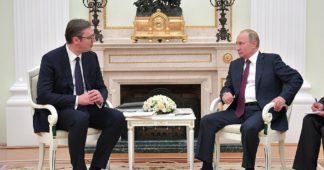About 2,500 radicalized opposition supporters gathered in Belgrade on Sunday and attempted to storm city hall after contested snap parliamentary elections last week. Sputnik asked leading geopolitical analysts, including a top American Balkans expert, for their takes on what happened, and who could be pulling the strings behind the scenes.
Dec 25, 2023
Sunday’s protests in the Serbian capital were a brazen attempt by the West to destabilize the situation in the Balkan country using “Maidan coup techniques,” Russian Foreign Ministry spokeswoman Maria Zakharova told Sputnik on Monday after being asked to comment on events in Belgrade from the night before.
Thousands of angry supporters of Serbia’s opposition assembled in 2 degrees Celsius weather in the center of the capital on Sunday, unsatisfied with the results of recent snap parliamentary elections, which were won by President Aleksandar Vucic’s Serbia Must Not Stop coalition, claiming the vote was rigged and demanding a revote.
Serbia’s authorities assured that the December 17 vote had been held in a transparent, free and fair manner, but many of the usual suspects from abroad, including European Parliament election monitors, as well as the Center for Research, Transparency and Accountability (a Serbian EU-funded and US National Endowment for Democracy-linked nonprofit) alleged “electoral abuses” and “irregularities that directly compromised election results.”
Curiously, the Organization for Security and Co-operation in Europe’s observation mission did not exactly march lockstep with Brussels’ “rigging” narrative, instead complaining about alleged “procedural deficiencies” that could just as easily be applied to elections in the US and most other Western liberal democracies.
“Though technically well-administered and offering voters a choice of political alternatives, [the elections] were dominated by the decisive involvement of the President which together with the ruling party’s systemic advantages created unjust conditions,” the OSCE assessment said.
“Fundamental freedoms were generally respected in the campaign,” the mission admitted, “but it was marred by harsh rhetoric, bias in the media, pressure on public sector employees and misuse of public resources…The work of the Republic Electoral Commission benefited from improved transparency,” the OSCE said. “While media covered all electoral contestants in line with the law, most national broadcasters lacked genuine analytical reporting, detracting from the voters’ ability to make an informed choice.”
Ultimately, the OSCE mission concluded that it could not find any instances of vote rigging, confirming that “election day was smoothly conducted,” barring some “procedural deficiencies.”
These “procedural deficiencies” were apparently enough for Serbia’s opposition to attempt to violently storm Belgrade’s City Hall on Sunday. Riot police quickly intervened, pushing protesters back using teargas and batons, with at least thirty officers injured, two seriously, in scuffles with demonstrators. 38 protesters were detained.
Authorities immediately recognized what was going on, with President Vucic appearing on television Sunday night to condemn the protesters as “thugs,” calling the unrest “a product of much more serious geopolitical circumstances” and an attempt “to destroy the autonomy, independence and sovereignty of the Republic of Serbia.” Prime Minister Ana Brnabic thanked Russia’s intelligence services for warning Belgrade of the impending unrest ahead of time.
Belgrade Mayor Aleksandar Sapic concurred with Vucic’s assessment of events, calling the violence the attempted “Maidanization” of Serbia’s capital.
Attempt to Rub Out Serbian ‘Sore Point’
“Serbia has long been a sore point for NATO and the EU,” Dr. George Szamuely, an American geopolitical commentator and senior research fellow at the London-based Global Policy Institute, told Sputnik, explaining the motivations behind possible Western support for a Maidan-style coup attempt in Belgrade at this particular moment in time.
“Serbia, along with the Republika Srpska (half of Bosnia and Herzegovina) have been the holdouts on NATO. Neither entity wants to join NATO. And both entities have refused to go along with the NATO-EU policy towards Russia. Both refused to impose any kinds of sanctions on Russia,” Szamuely, a renowned expert on the Western policy toward the former Yugoslavia, recalled.
“So this is a sore point because essentially NATO has encompassed the entirety of the European continent, with the exception of Serbia and the Republika Srpska, and NATO obviously wants to bring that to an end…They’ve been trying to push Vucic out for some time, and they’ve been trying to get rid of Milorad Dodik, the president of the Republika Srpska at the same time,” the observer said.
“What’s also important is that from the beginning, from the 1990s on, Serbia has always been seen as a substitute for Russia. Where Serbia is, there is Russia. It’s the one thing that prevents NATO from complete dominance of the Balkans. And it’s the area where Russia continues to have some influence in Europe. So if you want to push Russia out of Europe altogether, you have to deal with the ‘Serbia problem’. They came close from 2000 on, when you had the color revolution that overthrew [Slobodan] Milosevic. And then for the next eight years, they had this opposition that ruled and then the West recognized the independence of Kosovo. So they came close, but they couldn’t quite pull this off. And so this has been an ongoing thing to try to rectify the unfinished business from the 1990s,” Szamuely said.
Recalling that Sunday’s unrest in Belgrade was just the latest manifestation of attempts to oust Vucic, Szamuely noted that the Serbian president has had an “enormous amount of pressure” applied against him throughout the past year.
“There were very large protests taking place last May against Vucic, which was very strange because the ostensible reason for these huge protests were two mass killing events which were done randomly, just something tragic, very similar to what’s just happened in Prague, the kind of thing that happens a lot in the United States. But somehow the opposition in Serbia decided to blame the government for it. So they held these mass protests demanding elections…Vucic said, okay, fine, we’ll have elections, so they had the elections. The opposition lost,” and subsequently claimed “that this was a fraud, that this was stolen and so on, entirely in keeping with the color revolution” blueprint, Szamuely stressed.
Veteran international relations expert and Eastern European affairs specialist Dr. Gilbert Doctorow concurs with Szamuely’s assessment.
“We are witnessing this new attempt at a Maidan coup, because the authors of this attempt to overthrow Vucic are the same superficial Ivy League scenario plotters in the State Department, in the CIA, that have been guiding America’s disastrous foreign policy adventures for the past thirty years,” Doctorow told Sputnik.
“They fail to realize the importance of people in history. To be precise, they fail to appreciate that Vucic is not a pusillanimous fool like Ukraine’s Yanukovych, whose very lack of determination and courage made the victory of the coup possible in Kiev. Vucic is more like Lukashenko in Belarus; [the latter’s] stand against the rebels, Kalashnikov in hand, put down the insurrection there and deprived Washington of a cheap victory,” in 2020, he added.
The Serbian color revolution attempt is an attempt by Western powers “in stirring multiple pots” and “creating chaos in every strategically important region,” Doctorow believes. “Serbia is a thorn in the side of the collective West,’ but any attempts to coup Vucic will be “doomed to failure,” in the analyst’s view.
Sign of Desperation?
For his part, political analyst and former Member of the European Parliament Nick Griffin told Sputnik that the coup attempt in Belgrade is a sign of NATO’s growing “desperation” as it loses on other fronts, militarily and economically, against its global adversaries.
“I suspect that the West’s current Maidan effort in Belgrade is less about a carefully considered long-term plan and more a desperate flailing response to the NATO disaster unfolding in Ukraine,” Griffin said. “The scale of the defeat there is such that Western powers are in dire need not only of a distraction but also of a ‘victory’ – something they can wave around as evidence that they can still defeat the ‘evil plan of the monster Putin for world domination!’”
“On top of the above short-term issues arising from the Ukraine debacle, the disruption to shipping in the Red Sea has pushed the Chinese Belt and Road project back up to the top of the geopolitical agenda. The close relations established recently between Hungary and Serbia, which include major improvement works to the railway links between the two, take on greater significance with the possibility that ongoing tensions and conflict in the Middle East will make overland trade routes from China to Western and Arab markets much more important and profitable,” Griffin explained, highlighting the complex difficult calculations at play in the Balkans.
“Serbia has the potential to be hugely important as the final stepping stone to the Adriatic and beyond – especially if the victory of Russia in Ukraine were to convince Vucic to stop trying to walk the tightrope and to come down firmly on the Russian side and to push to connect Serbia properly to the Serbian enclaves on the coast,” the observer stressed.
Asked whether the West could ultimately succeed in its efforts to oust Vucic, Griffin stressed that this “depends on Russia!”
“There is absolutely no good reason to allow this half-cock Western adventurism to succeed, or even to continue. The lesson from the Kiev Maidan should surely be that it is far easier to deal with such things while they are being done by Western-funded hooligans and agitators than to wait until they are sitting in NATO-supplied tanks,” the veteran geopolitical observer summed up.
We remind our readers that publication of articles on our site does not mean that we agree with what is written. Our policy is to publish anything which we consider of interest, so as to assist our readers in forming their opinions. Sometimes we even publish articles with which we totally disagree, since we believe it is important for our readers to be informed on as wide a spectrum of views as possible.










